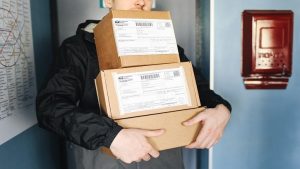
Integrating the speed of robotics with the human touch
As part of Instacart’s next-gen fulfilment initiative, the company will pair Fabric software and robotics with Instacart technology and shoppers. This will support a new fulfilment process within dedicated warehouses and existing retailer locations. The new process will integrate the speed of robotics with the human touch and attention to detail of Instacart shoppers. The company says this will enable faster fulfilment of customers’ full grocery shop. From packaged goods, household essentials and produce to deli items, frozen food and alcohol. Once orders are packed, shoppers will deliver orders to customers’ doors or place them in staging areas for curbside pickup.
Instacart plans to kick off early-stage concept pilots in partnership with Fabric and grocery retail partners over the coming year. “Instacart is proud to serve as the chief ally to retailers during a time when eCommerce in North America is poised for accelerated adoption. Our next-gen fulfilment initiative combines our robust technology suite. Together with a dedicated community of shoppers with robotics solutions to give retailers innovative ways to compete and serve online.
“Our next-gen fulfilment work will also help reduce some of the things that make in-store shopping cumbersome for Instacart shoppers. Such as crowded store aisles, out of stock items and long checkout lines,” said

“Over the long-term, we believe partnering with retailers to bring next-gen fulfilment technologies together. With the personal touch and care of Instacart’s shopper community will create an even more seamless online grocery experience. A service that’s faster and more affordable for customers and delivers even more value and growth to retailers.”
Built for speed
“Everything about our micro-fulfilment solution has been built for speed, efficiency, and elasticity to meet today’s on-demand requirements. This partnership with Instacart is another validation that Fabric’s tech and operations are best-fit to serve retailers’ next-gen fulfilment needs,” said Elram Goren, CEO and co-founder of Fabric. “Our software-led robotics and modular solution gives grocery retailers the flexibility to build the fulfilment solution that best fits the needs of their business. With Instacart as a partner, we see an enormous opportunity to integrate our product and services into Instacart’s ecommerce solutions. This will provide a compelling service offering for grocers. We continue to scale across North America and focus on unlocking more value for retailers and their customers.”
Instacart’s next-gen fulfilment initiative adds robotics solutions to the company’s existing grocery e-commerce offerings. Those offerings include the Instacart marketplace, which features more than 600 beloved national, regional and local retailers, including unique brand names; Instacart Enterprise, the company’s white-label enterprise-grade technology solution; and Instacart Ads, which connects thousands of Consumer Packaged Goods (CPG) brands directly to customers online.
Enterprise Times: What this means for business?
Fulfilment generally is one of the ugly sisters in the Cinderella tale of eCommerce. It’s often the forgotten component in the customer journey. A brand may provide a superior customer experience from migrating customers from prospects down the purchasing funnel. Through to completion at the shopping cart. However, if customers fail to receive their purchases on time. Or in a sufficiently satisfactory condition, then all that hard CX works goes to waste.
The Instacart strategic partnership with Fabric to provide automated fulfilment solutions to brick-and-mortar grocers in north America is a sensible step. The rise in eCommerce has resulted in some warehouses struggling to fulfil orders. They may struggle with inefficient despatch processes, shipping carrier complexities and often manual data entry. Hence the fulfilment sector is ripe for disruption and automation. Organisations providing automated fulfilment solutions to retailers will be in pole position to reap the benefits of online shopping.

























